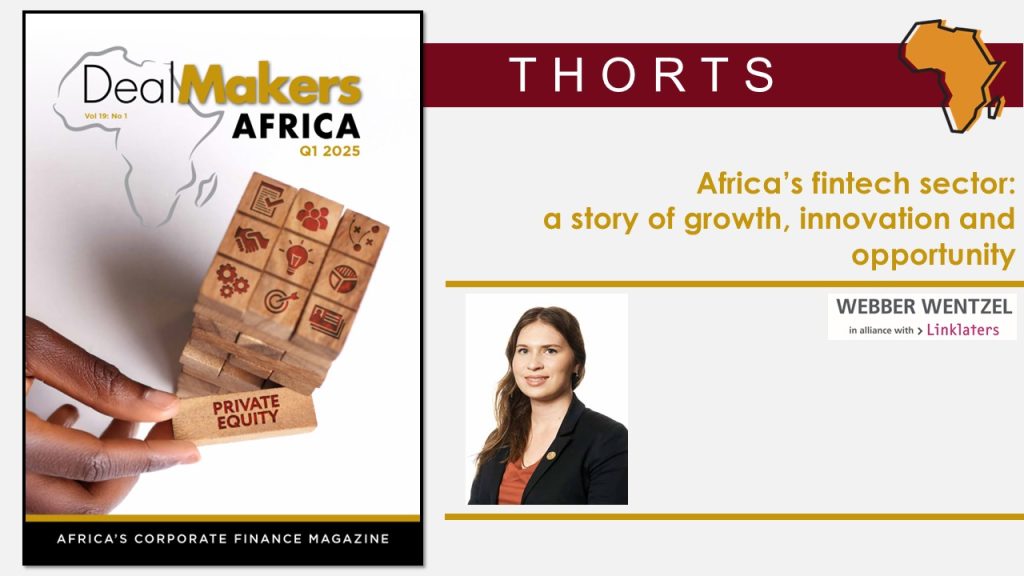Africa’s fintech evolution is a fascinating example of how a confluence of technological and customer behaviour trends can create not one, but several leapfrog moments.
The genesis of fintech’s success across the continent, especially payment providers such as Paystack, M-Pesa, Moniepoint, Mukuru, Momo Money and Flutterwave, is primarily due to the advances made in the telecommunications industry. As telecommunications providers built network infrastructure to support mobile phone access from Cairo to Cape Town, they unwittingly created the backbone that enabled feature phones and then smartphones to thrive across Africa.
It is the access created by these mobile technologies that has allowed consumers on the continent to connect to the global digital payments system, with PCs and laptops no longer a necessity. Before digital payments came into being, African consumers quickly adapted to new payment plans to go mobile, such as pay-as-you-go, which became available in South Africa in 1996.
In 2022, global consultancy McKinsey published a report called Fintech in Africa: The end of the beginning, where it stated:
“Our analysis shows that fintech players are delivering significant value to their customers. Their transactional solutions can be up to 80 percent cheaper and interest on savings up to three times higher than those provided by traditional players, while the cost of remittances may be up to six times cheaper.”
“Taken together with an influx of funding and increasingly supportive regulatory frameworks, these factors could signify that African fintech markets are at the beginning of a period of exponential growth if, as expected, they follow the trajectory of more mature markets such as Vietnam, Indonesia, and India.”
TELECOMS ARE BECOMING FINANCIAL SERVICE COMPANIES
Of further interest is the way in which, over the last decade, telecommunications companies have become financial service companies. Safaricom (owner of M-Pesa), MTN and Vodacom are examples of telecommunications companies that have leveraged their owned infrastructure to challenge, and often surpass, traditional banks to capture market share in the financial services sector, optimising opportunities for cross-selling.
Broadly speaking, African telecommunications providers have shown an appetite for calculated risk that their peers in Europe and North America would baulk at. Often, African providers are not just building telecommunications infrastructure at the greenfield stage, but other infrastructure taken for granted in older markets, such as roads, electricity and security, a role traditionally played by mining companies.
REGULATORY ENVIRONMENT AMONG KEY FINTECH CHALLENGES ACROSS AFRICA’S MARKETS
The fintech sector’s success across Africa’s markets does, however, run into its own challenges. According to McKinsey, the key challenges cited as stymying the continent’s fintech sector were scale and profitability, an uncertain regulatory environment, scarcity, and corporate governance.
Speaking to our clients operating across the continent, the regulatory challenge alone is one that poses significant delays and uncertainty for businesses.
Central banks and bodies that regulate the fintech sector play an outsized role in shaping national sector development. In fact, recent regulatory changes made by the Central Bank of Nigeria reportedly helped their fintech sector grow by approximately 70% in 2024.
Key to regulatory success is forming or leveraging existing relationships with regulators based on trust and mutual respect, which takes years to cultivate. Webber Wentzel partners with our clients to maintain and manage these relationships, working with specialist local firms and on-the-ground teams versed in the complexities of financial services and digital regulation.
On occasion, working with regulators also requires leveraging our legal expertise beyond the financial services sector, which is why it’s advantageous to partner with a full-service firm. While legal text can be interpreted in a limited number of ways, having the right personnel and expertise in the room is as much a success factor as legal knowledge, as noted by select clients.
INSURANCE – THE NEXT EXCITING MARKET
When speaking of fintech in Africa’s different markets, what is materially being referred to is Africa’s digital payments landscape. It has been the sector’s growth engine, with Africa accounting for around 70% of global mobile money payments in 2022.
But with payments reaching maturation, what’s the next frontier? According to some of our clients in the financial services sector, insurance is the next great fintech opportunity across the continent.
In 2022, the insurance penetration rate in East Africa’s various economies was dismally low: 2.14% in Kenya, and 0.62%, 0.74%, and 0.3% in Tanzania, Uganda, and Ethiopia respectively. The penetration rate of life insurance continent-wide was reportedly 1.6% in 2022, with South Africa accounting for 79% of total life insurance premiums in Africa.
Like the payments landscape, success will depend on having a nuanced understanding of local market conditions and consumer behaviour, in addition to conforming to the legal framework. For example, in Nigeria, a startup called WellaHealth has partnered with pharmacies to provide insurance products to pharmacy customers, knowing that most Nigerians will visit a pharmacy first, and self-treat before seeing a doctor.
As digital penetration continues to make inroads outside Africa’s largest markets, Africa’s fintech leaders will likely be joined by innovative newcomers in the next few years.
Liesl Olivier is a Senior Associate | Webber Wentzel

This article first appeared in DealMakers AFRICA, the continent’s quarterly M&A publication.
DealMakers AFRICA is a quarterly M&A publication
www.dealmakersafrica.com



